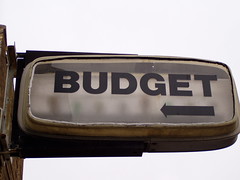Senate Budget Resolution to Call for Freezing All Non-Security Discretionary Spending
by Gary Therkildsen*, 4/21/2010
Budget Committee Chairman Sen. Kent Conrad (D-SD), who released his mark for the Senate's budget resolution yesterday, is calling for $671 billion more in deficit reduction over the next five years compared to the president's budget proposal. Conrad achieves his reduction by jettisoning the president's selected discretionary caps and placing a freeze on all non-security discretionary spending over the next three fiscal years.

This isn't exactly a huge surprise. Sen. Conrad recently told reporters that he would produce, in the words of a Congressional Quarterly article, an "aggressive" budget resolution this year "with deficits significantly below those in the president's [budget] proposal."
The Budget Committee chairman wants to get the deficit down to around 3 percent of annual gross domestic product (GDP) by 2015, which is a goal of the president's soon-to-commence fiscal commission. The idea is that writing a budget resolution that accomplishes this goal will allow Conrad and the other panel members to focus more of their "efforts on how to deal with the long-term growth in debt."
And while it seems reasonable that this approach might improve the fiscal commission's chances of producing substantive recommendations by removing likely controversial, short-term fiscal issues, one could question the wisdom of adopting such a sweeping spending freeze while the country's economy is just beginning to show signs of a recovery from one of the worst recessions in history.
Indeed, based on Conrad's mark, you would think that the economy has already recovered from close to 10 percent unemployment and that federal social programs that suffered through eight years of chronic underfunding by the previous administration were once again flush with funds.
The Senate recently twice voted down an amendment authored by Sens. Claire McCaskill (D-MO) and Jeff Sessions (R-AL) to impose a three-year cap on discretionary spending. And for good reason, as the "draconian discretionary budget caps" would have been much more severe than the president's proposed freeze. Details on Conrad's three-year discretionary spending freeze are sparse, but it probably won't be much better.
Image by Flickr user inked78 used under a Creative Commons license.



